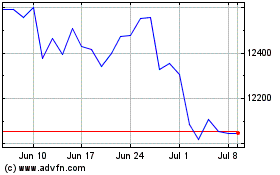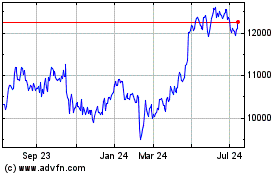By Jared S. Hopkins
The Biden administration's unexpected support for temporarily
waiving Covid-19 vaccine patents won't have an immediate financial
impact on the companies making the shots, industry officials and
analysts said.
Yet the decision could mark a shift in Washington's longstanding
support of the industry's valuable intellectual property,
patent-law experts said. A waiver, if it does go into effect, may
pose long-term risks to the vaccine makers, analysts said.
Moderna Inc., Pfizer Inc. and other vaccine makers weren't
counting on sales from the developing countries that would gain
access to the vaccine technology, analysts said. If patents and
other crucial product information behind the technology is made
available, it would take at least several months before shots were
produced, industry officials said.
Yet long-term Covid-19 sales could take a hit if other companies
and countries gained access to the technologies and figured out how
to use it. Western drugmakers could also confront competition
sooner for other medicines they are hoping to make using the
technologies.
A World Trade Organization waiver could also set a precedent for
waiving patents for other medicines, a long-sought goal of some
developing countries, patient groups and others to try to reduce
the costs of prescription drugs.
"It sets a tremendous precedent of waiving IP rights that's
likely going to come up in future pandemics or in other serious
diseases," said David Silverstein, a patent lawyer at Axinn,
Veltrop & Harkrider LLP who advises drugmakers. "Other than
that, this is largely symbolic."
Countries including India and South Africa want to open up the
intellectual property to help spur more production of shots for
developing nations where cases have been surging. Many of these
countries have limited doses, while the U.S. and other developed
countries enjoy far greater supplies and vaccinated more of their
populations.
The U.S., which for years has defended drug-company patents,
said Wednesday it supported a temporary waiver, surprising the
pharmaceutical industry and other countries. Vaccine maker stocks
fell on the news, though they have since shaved some of the
losses.
The waiver's fate, however, is unclear. It would need the
unanimous support of all 164 countries that are members of the
World Trade Organization. Chancellor Angela Merkel said Germany
opposed granting a waiver.
Drugmakers and industry experts say lifting intellectual
property won't help with supply because the bottlenecks are in the
limited raw materials and manufacturing capacity.
Companies have been ramping up vaccine production for months. It
has taken time, industry officials said, because the shots
currently available rely on newer technologies like messenger RNA.
With the extra output, Pfizer had begun shipping U.S.-produced
doses to countries including Mexico and Canada, while Moderna
agreed to donate doses to the Covax initiative to supply shots to
poor nations.
The companies were also in discussions with the Biden
administration about how to get more supplies to developing
nations, according to people familiar with the matter.
The industry proposed providing more doses to developing
countries at cost or not for profit, said Jeremy Levin, chairman of
the Biotechnology Innovation Organization, a trade group, and chief
executive of Ovid Therapeutics Inc. "These proposals appear to not
even have been looked at," Dr. Levin said.
The White House didn't immediately respond to a request for
comment.
Waiving intellectual property protections will have little
impact on the companies and their double-digit 2021 vaccine sales
forecasts, analysts said. The companies had signed contracts to
supply doses to various countries this year. Pfizer, which
developed its vaccine with BioNTech SE, booked about $3.5 billion
in sales during the first quarter while Moderna reported $1.7
billion in sales.
Pfizer said it expects about $26 billion in Covid-19 vaccine
sales this year, while Moderna forecast $19.2 billion based on
purchase agreements.
Johnson & Johnson and AstraZeneca PLC have said they would
sell their vaccine at cost or not for profit during the pandemic
while Pfizer has said that it would do so for poor countries.
Moderna has said it would price its vaccine in low-income countries
at its lowest-tiered price.
A patent waiver could have a long-term impact, however, by
accelerating the spread of the vaccine technology to other
countries.
Countries with proven biopharma industries such as China,
Russia, India and Japan may be able to scale up and compete with
the drugmakers for Covid-19 booster shots and vaccines for other
diseases sooner than they normally would be able to, health experts
said.
Without vaccine makers cooperating, countries or manufacturers
would have to reverse engineer the vaccines, a difficult and
time-consuming process, said Matthew Johnson, a senior director at
the Duke Human Vaccine Institute who previously worked for
drugmakers.
Depending on how a final waiver is defined, countries may still
need to force companies to provide know-how to make the shots,
patent-law experts and industry officials said.
Until now the U.S. had opposed sharing intellectual property,
patent-law experts said. The Biden administration's support may
portend a new approach. Democrats, including some presidential
candidates during the last election, have proposed invoking a
federal law to break patents on a drug when it is priced too high,
so-called "march in rights."
The administration's move could prompt developing countries to
feel freer to pursue trade secrets. "You're leaving countries free
to enact procedures or laws that will enable them to seize or steal
trade secrets, " said James Pooley, a former deputy director
general of the World Intellectual Property Organization.
Yet some industry officials and experts said the Biden
administration's support might be a one-time maneuver driven by an
unusual pandemic and designed to encourage the companies to further
collaborate with developing countries.
"It's a way of signaling the U.S. government is open for
matchmaking, not just domestically, which it's already done, but
matchmaking around the world," said Arti Rai, faculty director of
the Center for Innovation Policy at Duke Law.
Write to Jared S. Hopkins at jared.hopkins@wsj.com
(END) Dow Jones Newswires
May 07, 2021 15:19 ET (19:19 GMT)
Copyright (c) 2021 Dow Jones & Company, Inc.
Astrazeneca (LSE:AZN)
Historical Stock Chart
From Mar 2024 to Apr 2024

Astrazeneca (LSE:AZN)
Historical Stock Chart
From Apr 2023 to Apr 2024
